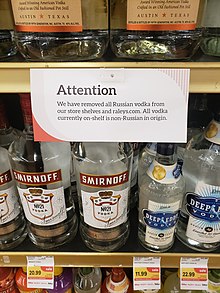**1. Economic and Financial Boycott:**
– Abrdn, Alaska Permanent Fund, American Express, and Apple Pay reducing or suspending operations in Russia and Belarus.
– Major financial institutions like Goldman Sachs, JPMorgan Chase, Legal & General, Mastercard, and Visa taking actions like winding down business operations, reducing holdings, and blocking transactions linked to Russia.
– Payment systems like Google Pay, JCB Co., Ltd., PayPal, Revolut, and Wise stopping services or transactions in Russia and Belarus.
– Superannuation and pension funds like Government Pension Fund of Norway, HESTA, Hostplus, and National Employment Savings Trust divesting or reducing exposure to Russian assets.
– Commodity trading and banking entities like Gunvor, Trafigura, World Bank, Western Union, and Church of England making decisions to freeze investments, stop operations, or divest from Russia.
**2. Academic and Research Boycott:**
– Universities like Deakin University, Durham University, edX, European University Association, and Julius Maximilian University of Würzburg halting collaborations or partnerships with Russian and Belarusian institutions.
– Research funding bodies like UK Research and Innovation agency, European Commission, German Research Foundation, Massachusetts Institute of Technology, and National Research Council suspending grants, payments, or collaborations with Russian entities.
– Exclusion from international competitions such as European Girls Mathematical Olympiad, International Mathematical Olympiad, International Mathematical Union, Journal of Molecular Structure, and European XFEL facility due to the involvement of Russian institutions.
– Cancellations and divestments by organizations like European Space Agency, French National Centre for Scientific Research, German Academic Exchange Service, University of Arizona, and University of Colorado in response to Russian involvement.
– Suspension of partnerships by entities like QS World University Rankings, Royal Netherlands Academy of Arts and Sciences, Stanford University, TalTech, and Universities UK with Russian and Belarusian counterparts.
**3. Energy and Industry Impact:**
– Actions in the energy sector like Lithuania ending gas imports, BP exiting Rosneft shareholding, Centrica terminating agreements, ExxonMobil cutting ties, and Eneos seeking alternative sources.
– Responses in the entertainment industry like Disney, Sony Pictures Entertainment, Warner Bros. Discovery, Paramount, and YouTube pausing releases, shutting down networks, or blocking access to Russian media channels.
– OTT Box and social media platforms such as Roku, Discord, TikTok, Spotify, and BBC Studios taking actions like removing content, suspending sales, or restricting access.
– Film festivals and broadcasting organizations like Cannes Film Festival, Venice Film Festival, National Association of Television Program Executives, European Film Academy, and European Broadcasting Union excluding or boycotting Russian participation.
– Opera houses and music organizations like Royal Opera House, Metropolitan Opera, Vienna Philharmonic, WWE, Linus Media Group, and Fédération Internationale Féline severing ties or banning Russian entities.
**4. Cryptocurrency and Technology Impact:**
– Coinbase, blockchain analytics, and cryptocurrency trading platforms implementing measures to block transactions, identify banned users, or not participate in the boycott.
– Critics highlighting double standards in economic isolation and ongoing sanctions affecting major companies still operating in Russia.
**5. Cultural and Entertainment Boycott:**
– Responses in entertainment and culture including reductions in entertainment products, bans from Olympics, scrutiny of past support, urging suspensions in sports, and cancellations of concerts.
– Events and music distribution companies like European Tree of the Year, Universal Music Group, PRS for Music, ASCAP, BMI, and SIAE taking actions such as excluding Russia from contests, suspending operations, or cancelling partnerships.
Since early 2022, Russia and Belarus have been boycotted by many companies and organizations in Europe, North America, Australasia, and elsewhere, in response to the 2022 Russian invasion of Ukraine, which is supported by Belarus. As of 2 July 2022[update], the Yale School of Management recorded more than 1,000 companies withdrawing or divesting themselves from Russia, either as a result of sanctions or in protest of Russian actions. Ukrainian National Agency on Corruption Prevention maintains a list called International Sponsors of War that includes companies and individuals still doing business with Russia.

